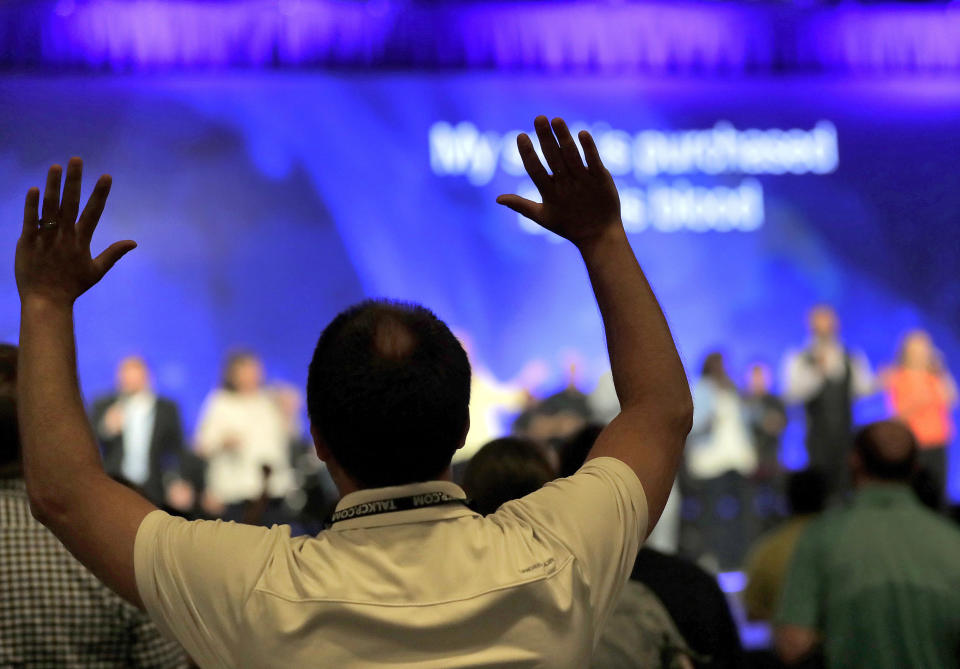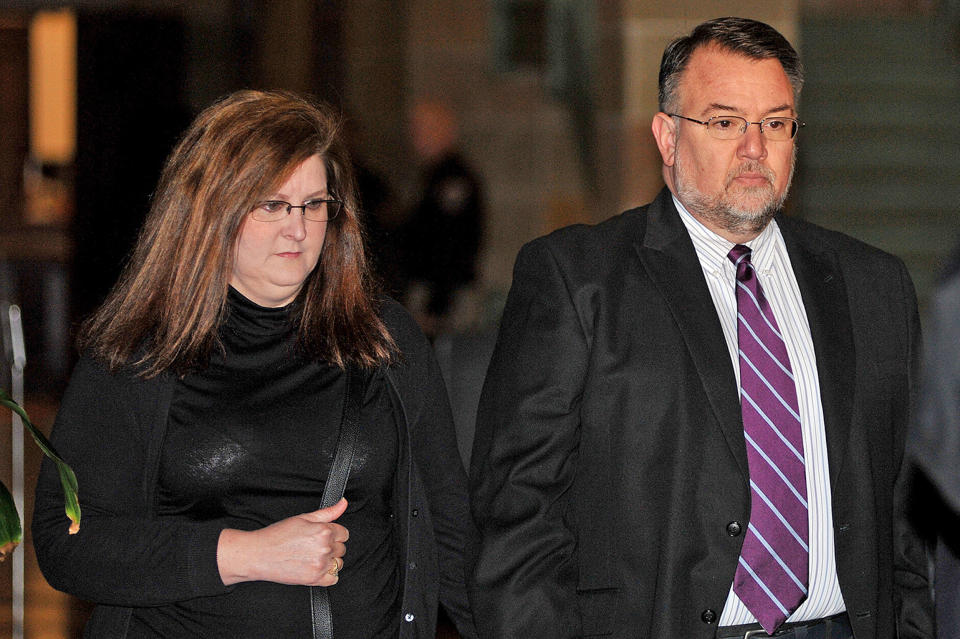Southern Baptist members call for cultural reforms after 'horrifying' report of sex abuse by clergy

- Oops!Something went wrong.Please try again later.
In the summer of 2010, a pastor and his wife at First Baptist Church in Woodstock, Georgia, said they received an invite to vacation in Florida with Johnny Hunt, a senior pastor of their church whom they considered a mentor.
The 55-year-old church leader had been elected national president of the Southern Baptist Convention two years earlier, making him one of the most powerful members of the largest denomination of Protestants in the U.S.
Hunt allegedly helped to book them a place in Panama City Beach that, unbeknownst to them, was directly beside his unit in the same condo complex, the unnamed young couple said in a 288-page blockbuster investigative report released Sunday by the Southern Baptist Convention. When the pastor’s wife arrived alone after a day out, she said she was greeted by Hunt, and they interacted from their respective balconies.
But when she invited him inside her condo to escape the heat and continue their conversation, during which she said she opened up about the stress she and her husband were under at the church, he became aggressive, she said to investigators, as detailed in the report. According to her, he pulled down her shorts, made sexual remarks about her body, and then pinned her to the couch and pulled up her shirt. She said in the report that he groped her and sexually assaulted her with his hands and mouth.
Moments later, she said in the report, Hunt — who is married with two adult daughters close to her age — texted her to come out to her balcony to discuss what had happened. Instead of an apology, she said, he made a proposition that they have sex three times a day.

Hunt did not immediately return a request for comment Monday about the allegations, but in a statement posted on Twitter following the report’s release, he denied its contents while also saying he had not yet read the findings in their entirety.
“To put it bluntly: I vigorously deny the circumstances and characterizations set forth in the Guidepost report. I have never abused anybody,” he wrote.
The report detailed widespread allegations of sexual misconduct among named clergy and a cover-up involving the upper echelons of the Southern Baptist Convention.
The denomination's executive committee contracted an outside firm, Guidepost Solutions, an independent consultant that conducts investigations on behalf of faith-based organizations, to launch an inquiry after delegates voted overwhelmingly for one last summer.
In its wake, Ronnie Floyd, a Southern Baptist Convention president from 2014 to 2016, resigned in October as head of the executive committee.
The report also goes over several reforms the church could implement, including creating and maintaining an “Offender Information System” to alert the community to alleged offenders, and restricting the use of nondisclosure agreements and civil settlements that bind accusers to confidentiality in sexual abuse matters.
A church task force will present its own recommendations based on the report during its annual meeting next month in Anaheim, California.

Already, the reaction from some prominent leaders of the Southern Baptist Convention and followers has centered on a demand for sweeping changes that ensure the accused are not protected and the abused are not silenced.
“What was published is heartbreaking, with some parts just horrifying,” tweeted J.D. Greear, a North Carolina pastor and Southern Baptist Convention president from 2018 to 2021 who has spoken in support of sex abuse victims. “We have no choice but to learn from our past and change the future.”
In response to the report, current Southern Baptist Convention President Ed Litton said in a statement Sunday that there “are not adequate words to express my sorrow at the things revealed in this report” and that Southern Baptists “must resolve to change our culture and implement desperately needed reforms.”
Litton could not be reached Monday for further comment.
Another leader of the denomination, Kevin Ezell, the president of the Southern Baptist Convention’s North American Mission Board, said he was unaware of any misconduct allegations against Hunt, who resigned from a leadership position with the board more than a week ago.
“I learned the details of the report today along with the rest of our Southern Baptist family,” Ezell said, adding that the details in the report are “egregious and deeply disturbing.”
He said he declined to speak publicly about Hunt’s resignation until after the Guidepost report was released “out of respect for the investigation.”
Neither the woman who accused Hunt of misconduct nor her pastor husband were named in the Guidepost report, which comes after a 2019 investigation by the Houston Chronicle and San Antonio Express-News documenting two decades worth of cases, in which pastors and deacons in Southern Baptist churches allegedly abused hundreds of people while for the most part remaining in their posts. In response to the newspapers’ report, church leaders pledged to protect victims and bring about change.
According to Guidepost investigators, Hunt gave an “unusual amount of attention” to the pastor’s wife while at the church and “groomed the couple with flattery and promises of help in ministry.”
The investigators said they interviewed other witnesses who helped corroborate the pastor and his wife’s allegations, including a counseling minister at First Baptist Church who confirmed being present for a session between Hunt and the couple, during which, he said, Hunt admitted to the woman’s husband that he sexually assaulted her. At that meeting, the couple also said Hunt stated, “Thank God I didn’t consummate the relationship,” according to the report.
Hunt also did not immediately respond to a request for comment about their accusations.
The alleged “survivor states that at the time she believed that, even though she did not consent to what Dr. Hunt did to her, she was made to feel it was consensual because she did not fight back,” the report said.
In addition, Guidepost investigators said the counseling minister told them that he remembered Hunt saying that “if this (story) got out, it could negatively impact 40,000 churches.”
The investigators said they interviewed Hunt twice, and during the second occasion he acknowledged he had known the younger pastor and considered himself a “strong influence” on his life. Initially, investigators said, Hunt did not recall spending any personal time with the couple nor inviting them to Panama City Beach but later remembered seeing the pastor’s wife on the neighboring balcony but had “no contact whatsoever.”
“He also restated that it was not true that he was on the balcony or in the condo,” the report said. “When asked specifically about whether he kissed her, pulled at her shorts, or fondled her, he said no. He denied sexualized comments about her appearance, panties, tan lines, or perfume.”
The Guidepost report goes on to mention other cases in which church leaders are accused of concealing wrongdoing. They include top leaders at Prestonwood Baptist Church in suburban Dallas, one of the largest churches in the country, allegedly protecting a music director accused of abuse in the 1980s and failing to notify police.
The music minister, John Langworthy, was “quietly fired” and moved to Mississippi, “where, in 2011, he confessed to his congregation at Morrison Heights Baptist Church in Clinton that he had committed ‘sexual indiscretions’ with teenage boys during his time at Prestonwood and before when he was in Mississippi,” according to the report.

Langworthy pleaded guilty to five counts of gratification of lust related to incidents in Mississippi from 1980 to 1984 and was sentenced in 2013 to a total of 50 years but avoided prison under a plea deal. He died in 2019.
In a statement, Prestonwood Baptist denied how the Guidepost report characterized the situation and said the church has “never protected or supported abusers, in 1989 or since.”
Throughout the report, churchgoers who say they were abused by clergy at various Southern Baptist churches across the country told investigators how they were repeatedly stonewalled in their efforts to be heard.
Jennifer Lyell, a former executive at a Christian media publishing company who came forward publicly in 2019 about sexual abuse, was described in the report as saying she had later been subject to harassment by fellow churchgoers, with some calling her a “whore” and “bitter jealous woman.”
Lyell said she was a student at Southern Baptist Theological Seminary when the abuse began, and she decided to speak out after learning the man she accused of abuse had returned to ministry.
The seminary's president, Albert Mohler, said in a statement that he was aware the Guidepost report would include information about Lyell's accusations against a faculty member.
"From the beginning we were prepared and determined to assist the investigators in any way possible and to support their work," Mohler said. "What happened to Jennifer was sexual abuse, unquestionably. The release of the report is the beginning and not the end of our challenge as a convention of churches."
"The real test for Southern Baptists is in how we deal with these sins," he added, "now that they have been exposed and are in the light."
Legal counsel for the Southern Baptist Convention's executive committee told The Associated Press in February that the body apologized to Lyell earlier this year and gave her a confidential monetary settlement related to how it handled her case.
But Lyell tweeted Monday that there must be further accountability for all.
“There are plenty of reasons to stay silent in a situation such as this,” Lyell said, according to the report. “But we must not be silent.”

